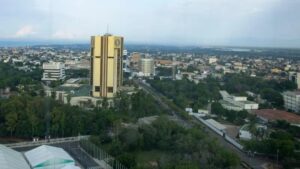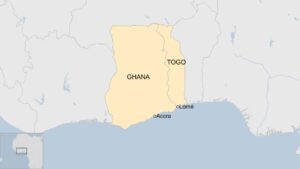
Deported from the US to Ghana then ‘Dumped’ at the Border: Nigerian Man Speaks Out
- Foreign News
- 03.10.2025
- No Comment
- 21
Deported from the US to Ghana then ‘Dumped’ at the Border: Nigerian Man Speaks Out
Togo’s capital city, Lomé, located near the Ghanaian border. Photo credit: Photothek via Getty Images
A Nigerian man deported from the United States to Ghana has shared with the BBC how he and five other deportees ended up stranded in Togo under troubling circumstances.
According to his testimony, Ghanaian officers secretly transported the group across the border without official clearance, leaving them “dumped” in Lomé, the Togolese capital.
This controversial move raises serious questions about deportation practices and human rights obligations in West Africa.
The deportee, who requested anonymity for safety reasons, explained that he was initially sent to Ghana after being removed from the US under its “crackdown on illegal immigration.”
Alongside other West Africans, including Nigerians, Liberians, and Gambians, he was flown out of the US on a military plane in shackles after spending time in detention.
The US Department of Homeland Security stated that all individuals had received due legal process before their removal.

However, his story took a disturbing turn in Ghana. He alleged that immigration officials deceived them into believing they were being moved to better accommodation. Instead, they were escorted through an informal border crossing into Togo, after police officers were allegedly bribed to allow the transfer.They did not take us through the main border. They paid the police and dropped us in Togo,
he claimed.
Now stranded in Lomé with no legal documents, he and four others have been forced to live in a hotel, surviving only with financial support wired by relatives abroad.We’re struggling to survive in Togo without any documentation. None of us has family here. We are just stuck in a hotel,
he lamented.
The language barrier further complicates matters, as Togo’s official language is French while most deportees only speak English.
The deportees had earlier complained about the deplorable living conditions at the Ghanaian military camp where they were initially placed. They requested better healthcare, medication, and water, but instead, they claim, were smuggled out of the country.
The Nigerian man revealed that his deportation has deeply affected his family in the United States.I have a house in the US where my kids live. How am I supposed to pay the mortgage? My kids can’t see me, and it’s just so stressful,
he said, his voice breaking with emotion.
He also expressed fears that his involvement with the Yoruba Self-Determination Movement, a group advocating for a Yoruba nation in southwest Nigeria, could lead to persecution if he is forced to return home.
The movement, while not banned, has been under heavy scrutiny from the Nigerian government. Last year, over 27 members were arrested for their activism. He fears that if he returns to Nigeria, he risks immediate arrest or even torture.
The US Department of Homeland Security has defended its actions, stating that the deportees were “illegal aliens” with final removal orders. Some, it claimed, had criminal records involving robbery, assault, fraud, and other serious offenses.
In fact, the Nigerian man admitted that he was convicted of conspiracy to commit bank fraud in 2020 and served a two-year sentence, though he maintains he was under a US court-ordered protection against deportation.
Ghana, meanwhile, is under fire for how it handled the group. Foreign Minister Samuel Okudzeto Ablakwa had earlier justified accepting deportees under “pan-African empathy.” However, opposition lawmakers argue that Ghana is being turned into a dumping ground for deportees without proper parliamentary approval.
They have demanded a suspension of the US-Ghana deportation agreement until further review.
The US policy of deporting individuals to “third countries” — nations other than their own — has faced widespread criticism. Several African governments, including Nigeria, have expressed disapproval of the practice.
Ghana’s President John Mahama reiterated that his country will not accept deportees with criminal backgrounds. Yet, the latest incident involving deportees being transferred into Togo raises fresh concerns about sovereignty, international law, and human rights abuses.
Legal experts argue that the alleged dumping of deportees in Togo without official notice violates both Togolese immigration laws and international conventions. Lawyers for the deportees have already filed legal action against both the US and Ghana, citing unlawful deportation and human rights violations.
For now, the Nigerian man and others remain stuck in limbo in Togo, awaiting legal intervention. Their case highlights the complexities of global deportation policies and the human toll on those caught in the middle.
Questions remain unanswered: Will Togo officially recognize them? Will Ghana be forced to take them back? And will the US face international backlash for its third-country deportation deals?
Until then, the deportees continue to live day by day, hoping their lawyers can secure relief. Their story is not only about deportation but about human dignity, rights, and the search for justice across borders.





